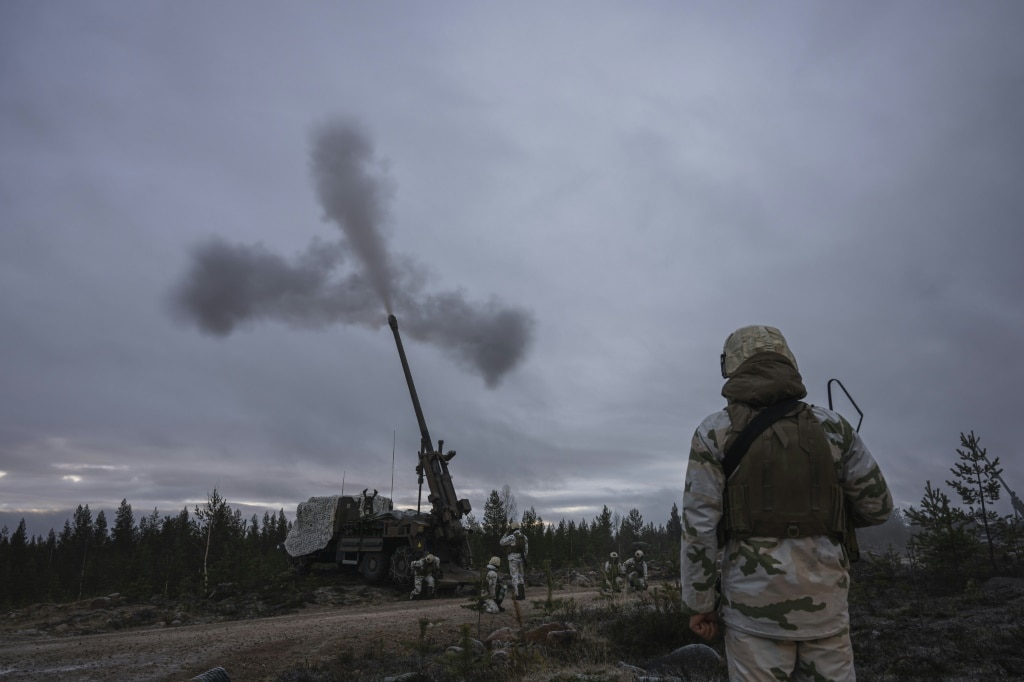Battle is hotting up for control of the Arctic
Rapid warming in the high north has made Greenland — and its rare earth elements — a valuable prize for China and the US.

Invasions can, of course, happen by stealth. Think of the Trojan horse. Or the Argentine scrap dealers planting a flag on South Georgia. Vladimir Putin’s little green men spending their 2014 summer holidays in Crimea.
You can’t rule out the possibility that this week’s trip to Greenland by Usha Vance, wife of the American vice-president JD Vance, is of a similar ilk, a bit part in Trumpian Weltpolitik. Not least because the national security adviser Mike Waltz and the energy secretary Chris Wright will also be visiting the huge semi-autonomous island at the same time, meeting US troops rather than nuzzling sledge dogs.
Greenland’s 40,000 voters went to the polls this month and its parties are yet to form a new coalition. Usha Vance’s attendance at the national dog-sled competition, the fabled Avannaata Qimussersua, did not, therefore, come via official invitation. Perhaps she is a husky fan. There may be a clue, though, in the name of the contest, which translates as “the Great Race of the North”.

What seems to be happening is another kind of great race, the collision of climate change with a geopolitical pivot. It is quite chilly in Nuuk at the moment – 0C, freezing rain – but by Arctic standards that is almost the riviera. Global warming is melting the ice floes on the northern sea lanes that link Asia to Europe. Mining executives say that prospecting – always a struggle with pack ice blocking ships, nasty wind grounding helicopters, digging machines stalling – has become more feasible. The Arctic is warming almost four times as fast as the rest of the world and access to rare earth elements will soon be easier.
That is of fundamental interest to China and so also to the United States.
In the 1980s the Chinese leader Deng Xiaoping observed: “The Middle East has oil, China has rare earths.” Beijing set out to dominate the business. It restricted rare earth exports to prod non-Chinese customers to buy Chinese products containing Chinese rare earths. China’s global control of the rare earths industry exposed what has been called “a single point of failure” in the green energy supply chain. The Chinese are streets ahead in the green arms race.

So far China, President Trump’s declared bugbear, has barely featured in his rush to challenge the world order. It guides, of course, much of his thinking on tariffs but the Trump team seem intent on decluttering the president’s foreign policy in-tray – Ukraine, the Middle East, nudging Europe on defence, de-Bidenisation – before embarking on an economic cold war with Beijing. That’s how an Arctic island has made its way on to the president’s desk: as an opening shot towards China, a way of blocking its rise.
The world is being told to choose between the American road – the MAGA way that lets you alone and perhaps richer providing you keep Trump happy – and China, which doesn’t keep you secure and makes all critical decisions behind a fog of deception. America makes its case by pointing to the spread of Chinese espionage operations in the Arctic.
China sniffed around the high north long before global warming caught on. In 2001 it raised the red flag of the People’s Republic in Svalbard and established an Arctic research centre. By 2013 it had won official observer status with the Arctic Council. Now it hoovers up all planning and strategy papers and spies on technical improvements in ice-breaking vessels and underwater cable security.

Western intelligence agencies have seen Chinese espionage activity keep pace with the warming of the seas. Chinese ocean-going ships are on the increase; so is spoofing of military GPS in the region. Alaska has become a big target. Fake tourists equipped with surveillance drones have been detained in Anchorage. Their targets: three military bases that can provide information about US nuclear defences and planning for the multinational Northern Edge war games. Spy balloons have hovered over Canada. Chinese fishing fleets steer further north towards Alaska.
It used to be seen as a naturally defended US border, its remoteness and winter cold providing a protective barrier. The unfreezing of the north has put paid to that. Given Alaska’s proximity to Russia, and Chinese intrusion, the Arctic is becoming a vulnerable entry point.
There remains, then, a strong security case for fortifying the relationship between the US and Greenland (and, by extension, with Denmark, which retains sovereignty over the territory) that stops short of annexation. The Greenlanders would probably favour that. Separating from Denmark would require a protector, a choice between Washington and Beijing. China remains controversial.
It tried to buy a Danish naval base on the island via a Hong Kong company in 2016. Two years later, it bid to extend runways at Greenland’s airports. Both were blocked by Copenhagen. The Greenland home rule government, while keen for Chinese investment, is suspicious of the environmental damage created by their mining companies.
The vice-president’s instinct is to foist a choice on Greenland using the overwhelming argument that only alignment with, and total fealty to, the US can work for a territory in a troubled neighbourhood.
He notoriously tried that pitch on Volodymyr Zelensky. There are some Musk-sceptics in the administration who agree, arguing it makes more sense to colonise Greenland, a three-hour flight from New York, than Mars. They would do better, though, to watch how Mrs Vance’s softly-softly approach plays out. Her interest in the mushers and dogs of a 4000-year island tradition suggests, at least, a respect for its people.
The Times




To join the conversation, please log in. Don't have an account? Register
Join the conversation, you are commenting as Logout